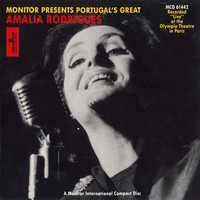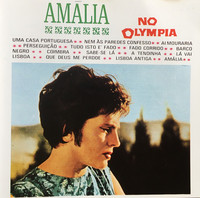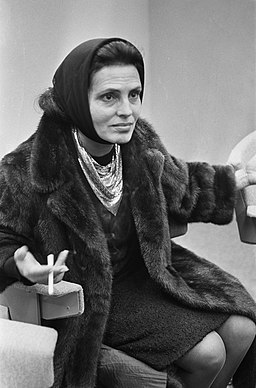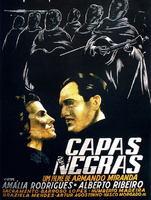Amália Rodrigues (Portugal, 1920-1999)
BIOGRAPHY
Singer and actress
Known as the "Rainha do Fado" ("Queen of Fado"), Amália Rodrigues was a Portuguese singer and actress best known for her passionate and romantic, yet hauntingly tragic, renditions of fado, Lisbon’s traditional form of song. Amália was born in July 1920 in Pena, a parish of Lisbon, Portugal. As one in ten children born into a poverty stricken family, Amália had to sew, embroider and peddle fruits while also working in a sweets factory after her completion of primary school. Since her childhood, Amália demonstrated a talent for singing, debuting formally to great success in 1939 at 19 years old. During World War II, she carried out extended tours for Spain and Brazil, and in 1945, she obtained her first great musical hit with the song Ai Mouraria. After which, Rodrigues began her acting career with the 1947 film Capas Negras, followed by her best known movie, Fado (1947).
As her fame increased, she began to stretch the traditional boundaries of fado, incorporating Spanish and Mexican rhythms into her songs and using contemporary poetry as a source for her lyrics. Amália’s success was undeniable, transforming her into an ambassador of sorts for Portugal, due to the large contributions she made to both fado and the expansion of the Portuguese influence. However, her image was tainted with criticism after the Revolution of the Carnations in 1974, when accusations arose that she had collaborated with the recently toppled dictatorship. Nonetheless, one year afterwards Amália acted in the Coliseu Theater of Lisbon where 5,000 people applauded her performance on foot, demonstrating with this that the public had never truly released her. In Amália’s later years, she received countless decorations and honors both inside and outside of Portugal, including the Grand Cross of the Order of Santiago, Portugal’s highest honor. Amália passed away in her home in Lisbon in 1999 and was later buried with official ceremony, leaving the entirety of Portugal in mourning. Until this day, Amália Rodrigues remains the highest selling Portuguese singer of all time.
OBITUARIES
-
Pareles, Jon, "Amália Rodrigues, 79, Queen of Fado, Lisbon's Sad Songs." New York Times, October 7, 1999: C23. (ProQuest Historical Newspapers: The New York Times with Index)
FEATURED BOOK
Amália Rodrigues was the author of many of the poems she sang and published on record, some of which are her most important hits. These poems were collected and published in her book Versos.
- Versos, 1997. (IUCAT)
PERFORMANCES
Gaivota
- Amália Rodrigues - 'Gaivota' (Official Video). Video, 04:10. (YouTube)
Estranha forma de vida
- 'Estranha forma de vida' (Official Video). Video, 03:42. (YouTube)
Barco negro
- Barco negro - Amália Rodrigues - English subtitles." Video, 04:20. (YouTube)

Album cover of Portugal's Great
Amália Rodrigues Live at the Olympia Theatre in Paris.

Album cover of Amália No Olympia.
DISCOGRAPHY
This selection of recordings encompass Amália Rodrigues most well-known works, including The Art of Amália Rodrigues and Amália No Olympia. These works serve to illustrate Amália's musical evolution through her career. These resources are only available to authorized users of Indiana University.
Portugal's Great Amália Rodrigues Live at the Olympia Theatre
- Portugal's Great Amália Rodrigues Live at the Olympia Theatre in Paris. Monitor Records, streaming audio. (Alexander Street Press)
The Art of Amália Rodrigues Vol. I
- The Art of Amália Rodrigues Vol. I. Recorded January 1, 1998. Som Livre, 1998, streaming audio. (Alexander Street Press)
The Art of Amália Rodrigues Vol. II
- The Art of Amália Rodrigues Vol. II. Recorded January 1, 2007. Som Livre, 2007, streaming audio. (Alexander Street Press)
Best of Fado - Tribute to Amália Rodrigues, Sung by Matilde Larguinho
- Best of Fado - Tribute to Amália Rodrigues, Sung by Matilde Larguinho. Recorded June 21, 1994. ARC Music Productions, 1994, streaming audio. (Alexander Street Press)
Amália No Olympia
- Amália No Olympia. Recorded March 31, 2008. IPLAY, 2008, streaming audio. (Alexander Street Press)
For additional works by Amália Rodrigues available at Alexander Street, click here.
FILMOGRAPHY
- Miranda, Armando de. Capas negras. Exclusivos Triunfo, 1947.
- Queiroga, Perdigão. Fado, história d'uma cantadeira. Lisboa Filme, 1947.
- Wenders, Wim. Until the End of the World. Warner Brothers, 1991.
BIBLIOGRAPHY
Some resources are only available to authorized users of Indiana University.
Writings
Articles
- Holden, Stephen. "Film in Review: The Art of Amália." New York Times (December 8, 2000): E20. (ProQuest Historical Newspapers: The New York Times with Index)
- Pareles, Jon. "Fado by Amália Rodrigues." New York Times, November 6, 1990: C14. (ProQuest Historical Newspapers: The New York Times with Index)
Books
- Castelo-Branco, Salwa El-Shawan, and Susana Moreno Fernández. Music in Portugal and Spain: Experiencing Music, Expressing Culture. New York: Oxford University Press, 2019. (IUCAT)
- Schnabel, Tom. Rhythm Planet: The Great World Music Makers. New York: Universe, 1998. (IUCAT)
Dissertations
- Corte-Real, Maria. 2000. Cultural Policy and Musical Expression in Lisbon in the Transition from Dictatorship to Democracy (1960s–1980s). Order No. 9998142, Columbia University. (ProQuest Dissertations & Theses Global)
Encyclopedias
- Castelo-Branco, Salwa El-Shawan. “Fado.” Grove Music Online. Oxford University Press, 2001. Accessed 2 Oct. 2020. (Oxford Music Online: Grove Music Online)
-
The Editors of Encyclopaedia Britannica. "Amália da Piedade Rebordão Rodrigues." Encyclopaedia Britannica. (2020, October 02). Accessed 4 Nov. 2020. (Encyclopædia Britannica)
For additional works on Amália Rodrigues available at IU Bloomington Libraries, click here.






